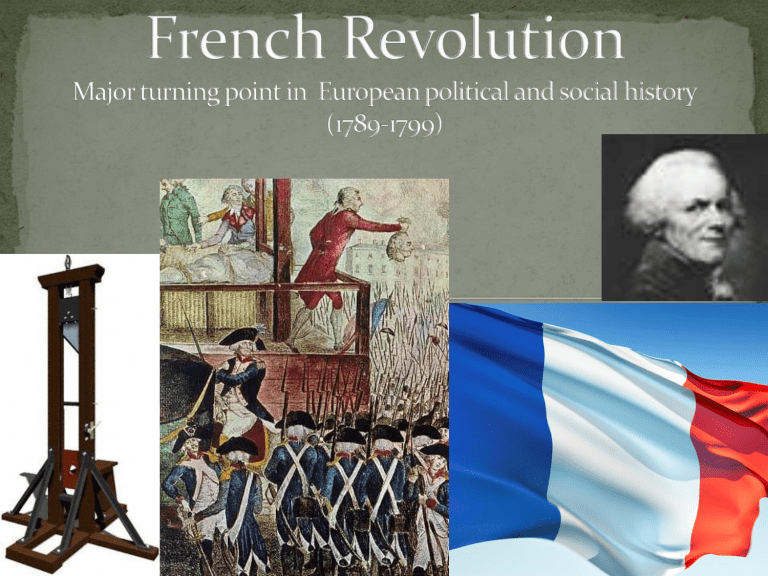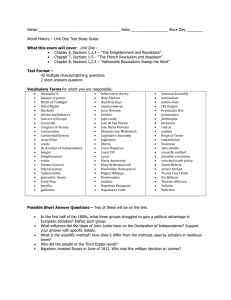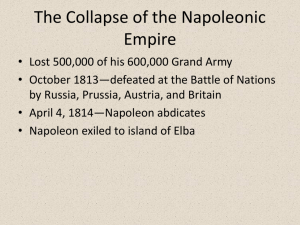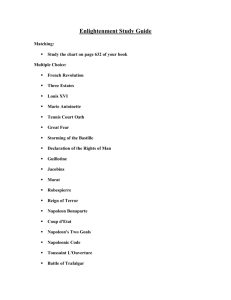French Revolution

Divided into 3 estates, classes;
1 st Estate- made up of clergy
Owned 10% of land and paid no taxes. (130,000 ppl)
2 nd Estate- made up of nobility
Owned about 15% of land, and paid no taxes. (350,000 ppl)
3 rd Estate- made up of peasants, bourgeoisie, middle class, and urban workers. (98% of population)
Large amount of deficit spending, government spends more money than it takes in.
Bad harvests and debts incurred from the American
Revolution and Seven Years War bankrupted the country.
Louie XVI was forced to recall the Estates-General,
France’s legislative body consisting of representatives of the 3 estates.
First debate was over voting.
3 rd Estates declares themselves the National Assemble of the people in France
They later found their meeting hall locked by the two other estates.
They meet on a tennis court next to Versailles and took the Tennis Court oath
They would continue to meet until they had a sound
Constitution
Bastille was a medieval fortress used as a prison for political prisoners in Paris
July 14, 1789 the Bastille was stormed by Parisians. The commander and 5 guards were killed.
This event showed a clear challenge to the regime of
Louis XVI.
The “Great Fear”
Rumors spread that the nobles hired robbers to kill peasants and seize their property.
Defiant peasants set fire to old manor records, noble’s houses, and stole grain.
Nobles agree to give up many privileges including voting.
Writes the Declaration of the
Rights of Man
All men are free with equal rights before the law
People have certain natural rights, freedom of religion, taxes levied according to ability to pay.
Government protects the rights of the people
Women were not included, tried to pass a rights for women act, but it was voted down.
Declaration of
Independence
Life, Liberty, Pursuit of
Happiness
Freedom of Religion
All men are created equal.
Freedom of speech
Can’t be put in jail without a trial
Declaration of the
Rights of Man
Life, property, security and resistance to oppression
Freedom of Religion
Men are born and remain free and equal
Free communication of ideas and opinions
Can’t be imprisoned except for when laws are broken
Born in Austria.
Disliked by her people.
Did attempt to help the poor, but her lifestyle overshadowed her attempts.
Women marched on
Versailles refusing to leave until the king met their demands.
King agrees and his family goes to Paris. Lived as prisoners for the next 3 years.
Place the Catholic Church under state control
Louis XVI tries to escape with his family, but is caught and returned to Paris.
Most countries agreed with the French Revolution in the beginning and then turned away from it.
People who supported the American Revolution condemned the French Revolution
Catherine the Great burned Voltaire’s books.
Prussia and Austria threatened war to protect the
French monarchy.
France declares war on Austria, Prussia, Britain and all other monarch states.
France was being dominated in the wars with surrounding countries.
People blamed the royal family for the problems
People begin executing prisoners who were thought to be enemies of the state
The monarchy was voted to be abolished and the
French Republic was set up
Louis XVI was put on trial as a traitor for attempting to leave the country.
He was executed by the use of the guillotine along with his wife.
Jean Paul Marat
Extremely radical
Believed in the use of violence to achieve the goals of the Revolution
Promoted the killing of prisoners against the state in Paris
Had a bad skin diseases after living years of his life in the sewers beneath
Paris
Was killed in the bathtub by a women.
Was known as the incorruptible
Student of Rousseau
Did not want the revolution to be violent, but later found only violence could allow the revolution to reach its goal.
Executed by the guillotine which he made famous.
September 1793 to July 1794
Lead by Robespierre and the
Committee of Public Safety
Suspects were those who opposed the revolution
Guillotine was used as a humane type of execution.
More than 17,000 people were killed during this time period by the guillotine. Clergy and nobility made up 15%.
Two large revolts at Nantes and Lyon.
France creates a new government called the
Directory
Acted as a dictator, but did make peace with
Prussia and Spain.
Still the problems of food shortages and inflation
Out of this chaos rises
Napoleon.
Nationalism- strong feeling of pride in and devotion to one’s country.
People became loyal to the country not the monarch.
Unique cultural identity of a people based on common language, religion, and national symbols.
France and Napoleon introduced the idea and were seen as the oppressors.
Born in Corsica (1769), was sent to France at the age of
9 to be trained as a soldier.
At 20 he was a lieutenant. Fought many battles against
Britain and Austria.
Fought Britain in a battle in France where he was easily beaten. He deserted his troops and returned to France.
Becomes leader of
France in 1802. Changed his name to Emperor
Napoleon I
Invited the Pope to oversee his coronation.
He took the crown from the Pope and crowned himself and his wife.
People were allowed to vote in the government, but Napoleon had final say.
Made peace with the
Catholic Church
Passed a new law code called the Napoleonic
Code
Kept new ideas that satisfied all classes
Prompted religious freedom, equality for all and destruction of feudalism
He conquers the Netherlands,
Belgium, and parts of Italy and Germany and destroys the Holy Roman Empire.
He placed many relatives in control of countries as alliances.
1803 Britain, Austria, Russia and Prussia join against him
Strike against Britain
Navy was crushed by the
British fleet.
Comes up with the
Continental System
Napoleon closes Europe to
British goods.
Nationalism, the French idea, worked against Napoleon causing revolts
Russia
Tsar Alexander had been an ally to Napoleon.
Napoleon takes the Grand army to invade Russia
(600,000 men)
Russia retreated and burned villages and land
Napoleon reached Moscow, but found it burned.
He retreated out of Russia because of cold and supplies
After Waterloo, diplomats and heads of states had a meeting to break up Europe.
Clemens von Metternich of
Austria was the leader. Russia,
Prussia, Great Britain and
France attended.
Chief goal was to create lasting peace by establishing a balance of power and restore the monarchies. (Worked until 1914).
Established the Concert of
Europe
Wanted to contain France
Prevent another Napoleon
Four powers agreed to meet at times to keep the balance of power
Added the principle of intervention
4 powers had the right to send armies into countries where there were revolutions in order to restore the monarchy
Britain did not accept.




